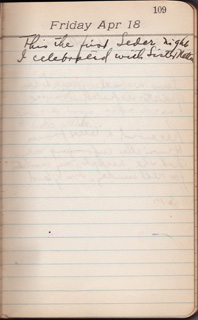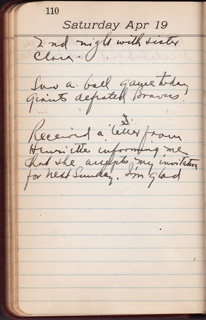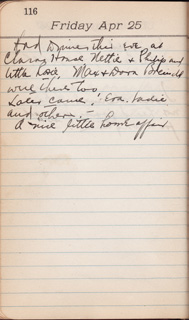
Sent home 20 pounds of Matzos for the
Passover holiday in 2 packages
I hope they get them in time.
Nettie received a letter
from the School to come and
pay up for her husband, when
she went there with Mrs Breindel
asking what does he mean by
writing letters when he rejected
Philip from School, also reminding
him that he was agreed to me and
her on $2.00 a week.
He chased them out of the office
without any reason whatever
this is outrageous.
I shall stop from work for some
time tomorrow and go to Lawyer
Levine about it
———
Matt’s Notes
To recap: Philip, who was married to Papa’s sister Nettie, was taking English lessons at a place called the Success School. Papa was paying for the lessons but couldn’t raise the $50 tuition fee all at once, so he’d arranged to pay the school in installments of $2 a week. The school’s headmaster agreed to this arrangement but later changed his mind, tried unsuccessfully to get full payment from Papa, and finally kicked Philip out of school.
Looks like the headmaster now tried to get the full tuition from Nettie, who brought Mrs. Breindel (a neighbor?) with her for backup since Papa was at work. Papa’s use of the phrase “chased them out of the office” strikes me as absurd, as if the whole episode is a scene from a silent film: the headmaster, wearing a mortarboard and robes, chasing after Nettie and Breindel with a pointer as they bustle down the hall, flinging Yiddish curses and trying not to trip over their skirts. It’s not absurd at all, of course, since assholes like the “school man,” as Papa called him, were (and still are) all too common in the lives of immigrants. I’m sure they didn’t go a day without someone trying to exploit, intimidate or quietly cheat them in some way.
Meanwhile, I’m trying to picture how Papa sent 20 pounds of Matzoh back to the old country. There must have been dozens of shipping companies around, and probably plenty geared toward specific immigrant groups. Did he just walk over to one of their offices with two ten-pound boxes? Did the landsmanshaftn have special services to help transport perishables around the holidays? In my dream, I answer my questions when I find a 1924 photo of a shipping company storefront with Yiddish signs in the window. I would have to read Yiddish to know what I was looking at, of course, but since it’s a dream I can do that, too. While I’m dreaming, I’ll also throw in some way of doing nothing all day but working on this diary project. Maybe I’m a pitcher for the Mets and have a lot of free time in the off-season.
Anyway, I wouldn’t be surprised if Papa bought his Matzoh at the fabled Streit factory, or if he even knew and admired the Streits. They opened their shop only three years after he arrived in New York and only two blocks from his first apartment, so he would have watched them grow, found encouragement in their success, and admired the mix of old-world tradition (matzhoh making) and American-scale ambition (a matzoh factory!) in their example. I really can’t remember the last time I bought Matzoh, but this year I’m definitely going to pick up a box of Streit’s, which still has a factory on the Lower East Side.
————
Additional references for this post:
- Here’s a page on koshertoday.com that discusses the history of Matzoh in the U.S.
- This piece in wirednewyork.com discusses the changing Lower East Side and mentions Streit’s
(Thanks to Beth at Jewcy.com for the pointers)
—————-
Updates:
My mother adds:
It just occurred to me that Mr. Breindel was the man who met Papa and Nettie when they disembarked at Ellis Island. I think this is correct, but I’m hazy about it. Could he be the one that brought them to his apartment to sleep in the same bed as his three daughters? They were distant cousins –this may be why Mrs. Breindel was so helpful to Nettie.
Also, I learned earlier today that Beth at Jewcy.com, who pointed me to the links above, also wrote a nice little post about this project on her blog.

 2nd night with Sister Clara
2nd night with Sister Clara


